|
|
||||
| GENOCIDE EDUCATION | ||||
|
GENOCIDE EDUCATION 2004-present |
||||
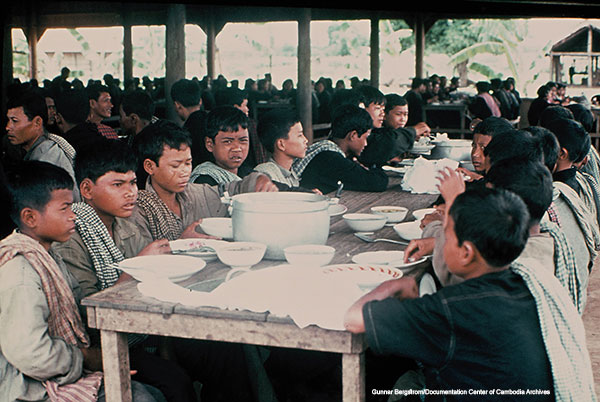 |
||||
|
Children
mobile unit, photo by Gunnar Bergstrom in August 1978. After the collapse of the Khmer Rouge regime on 7 January 1979, hundreds of thousands of children were left orphaned.
Source: Documentation Center of Cambodia Archives. Poster |
||||
|
Cambodian schoolchildren are taught that 3.3 million people were
killed under the 1975-1979 Democratic Kampuchea regime (most scholars
place the number at around 1.7 million). But the Royal Government of
Cambodia, which prepares school
texts,
has done surprisingly little to educate people born after the regime
about the genocide. For example, the entire 9th grade text
on the regime for the year 2000 reads: From April 25 to
April 27, 1975, the Khmer Rouge leaders held an
extraordinary Congress in order to form a new Constitution, and
renamed the country “Democratic Kampuchea.” A new government of the DK, led by Pol Pot, came
into existence after which Cambodian people were
massacred. By 2002, coverage of the regime had disappeared from junior and senior high school texts (the section on modern history was torn out as a result of an intra-government dispute over the treatment of the 1993 elections). No new texts were published in 2003 or 2004. With the passage of time, both the leaders of the Khmer Rouge and its victims are growing older. Without a concerted effort, students of this and future generations may know little – if anything – about the history of Democratic Kampuchea. Cambodia’s many pressing developmental needs have meant that the Ministry of Education’s resources are stretched thin (few teachers are properly trained on teaching such sensitive but critical subjects as genocide). Thus, the Ministry has sought DC-Cam’s assistance in providing supplementary text on the Khmer Rouge and other educational materials related to genocide. This project will seek to enhance the capabilities of teachers and the Ministry of Education to convey the regime’s history through the provision of ideas, materials, recommendations on curricula, a short text on Democratic Kampuchea, and a collection of survivors’ stories. |
||||
| Background | ||||
| n | Reviews | |||
| n | Ministry of Education, Youth and Sport | |||
| Material | ||||
| n | A History of Democratic Kampuchea (1975-1979) | |||
| n | Teacher's Guidebook (2009) First Edition | |||
| n | Teacher's Guidebook (2014) Second Edition | |||
| n | Student Workbook | |||
|
n |
Listening to, 'A History of Democratic Kampuchea (1975-1979)' produced by VOA | |||
| n | Classroom Forum Poster | |||
| n | Genocide Education Poster | |||
| n | Genocide Prevention Poster: Khmer | English | |||
| n | Genocide Education Memorial Poster | |||
| n | A History Classroom at Former Khmer Rouge S-21 Prison Poster | |||
| Training | ||||
| n | National High School Teacher Training (24 Teachers) | |||
| n | Provincial High School Teacher Training (180 Teachers) | |||
| n | Commune High School Teacher Training (3,500 Teachers) | |||
| n | Pre-Service Teacher Training | |||
| n | Police & Army Training | |||
| n | National University Lecturer Training (200 Lecturers) | |||
| n | Meeting between DC-Cam staff and National Teacher on August 9, 2013 | |||
| Activies | ||||
| n | Genocide Educational Memorial | |||
| n | Genocide Education Public Forum in the Most Remote Areas of Cambodia | |||
| n | Teacher Workshop-Working Group on Reclaiming Cambodian History | |||
|
n |
Distribution of "A History of Democratic Kampuchea" to 1,321 Government's High Schools and Other Private Schools Across Cambodia (Estimated One Million High School Students to Receive the Book) | |||
|
n |
Dr. Ka Sunbaunat, Khmer Rouge survivor and psychiatrist discussed, “The Impact: How History Teacher Who Were Victim of the Khmer Rouge Teaching the Khmer Rouge History to the Students Who Are the Children of the Khmer Rouge Perpetrators.” | |||
|
n |
Classroom Forum on "The Importance of Studying the History of Democratic Kampuchea (1975-1979)" - 2016 Schedule: Khmer|English Poster |
|||
|
n |
Classroom Forum on "The Importance of Studying the History of Democratic Kampuchea (1975-1979)" - 2017 Schedule: Khmer|English Program: Khmer | English |
|||
|
n |
Classroom Forum on "The Importance of Studying the History of Democratic Kampuchea (1975-1979)" - 2018 Schedule: Khmer|English Program: Khmer | English |
|||
|
n |
Classroom Forum on "The Importance of Studying the History of Democratic Kampuchea (1975-1979)" - 2019 Schedule: Khmer|English Program: Khmer | English |
|||
| n | Achievement as of 2016 | Work Plan for 2017 | Brochure 2017 English | Khmer | |||
| n | History from the Villages, 2017 | |||
| n | Genocide Comparative, 2017 | |||
|
n |
Development of Genocide Education into
University Program for ASEAN: Peace and Human Rights Education Programme, 2017-20 |
|||
|
n |
An interactive multimedia website to educate young Cambodians about Khmer Rouge era | |||
| It presents information on the Khmer Rouge in a variety of media. Users will be able to navigate through historic film and audio material, rare photographs, and contemporary interviews with survivors and former KR cadres from across the country. | ||||
 |
n |
Khmer | ||
|
n |
English | |||
|
n |
German | |||
|
n |
French | |||
| Photo Gallery | ||||
| n | Training | |||
| n | Book Distribution | |||
| n | Glogan | |||
| n | Public Forum | |||
| n | Classroom Forum | |||
| Report | ||||
| n | Teacher Training Interim Report, 2009 | |||
| n | Teacher Training Final Report, 2010 | |||
| n | Teacher Training Survey Data, 2010 | |||
| n | Quality Control, 2011/2012/2013 | |||
|
n |
Development of Genocide Education into A Certificate Program in Genocide, Conflict and Human Rights, 2015 | |||
| n | Solicitation for a Short-Term Consultancy for Genocide Education Project | |||
|
n |
PREY VENG DOCUMENTATION CENTER (2018) | |||
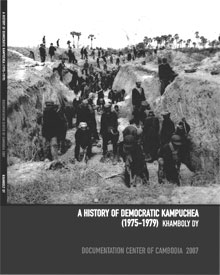
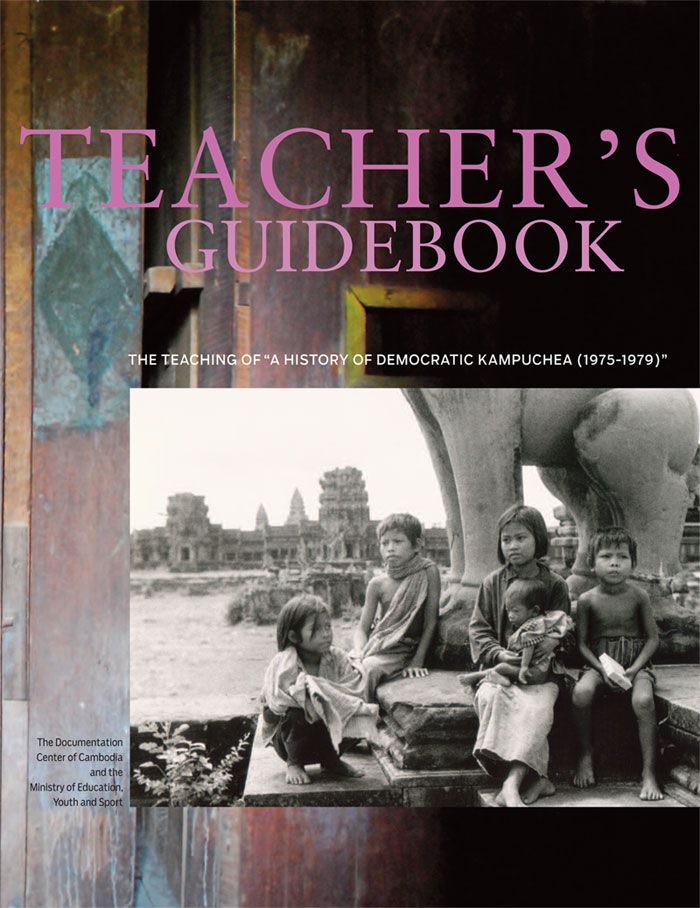 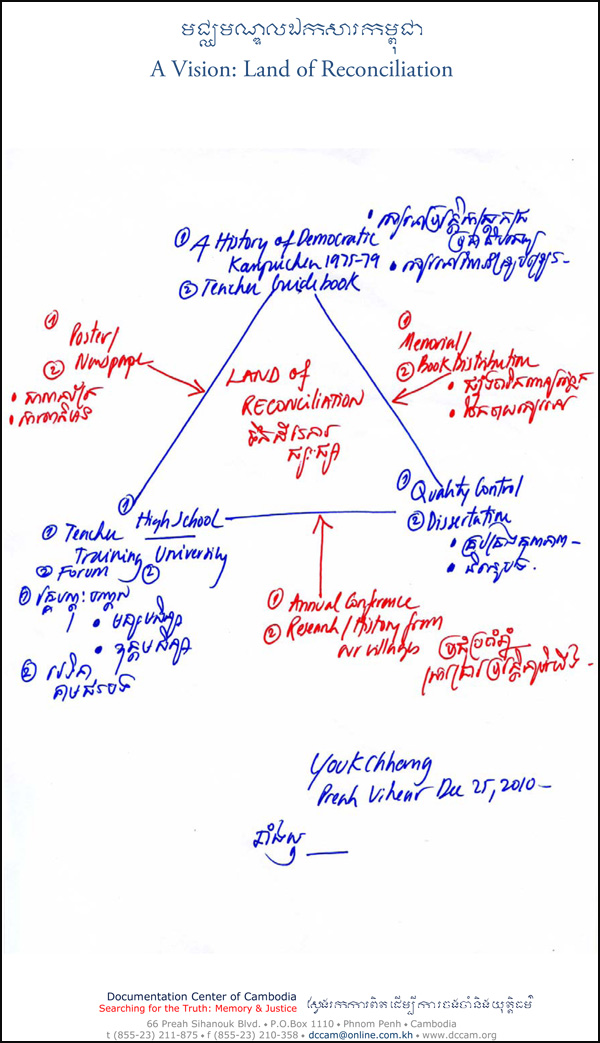
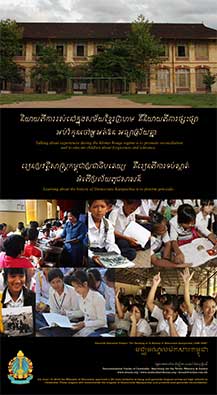 |
||||
| More information please contact: | ||||
| Pheng Phong-Rasy (M.A. De La Salle)Team Leader | ||||
| Min Sanas Researcher | ||||